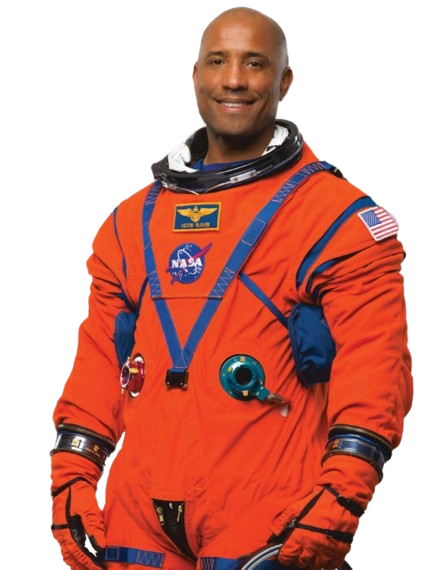
In 2024, astronaut Victor Glover will be part of the first crew to travel to the Moon in more than 50 years. As the pilot, he will fly the spaceship, named Orion, around the Moon but Orion won’t land on the surface. “Our mission – Artemis II – is to make sure that the Orion spacecraft is safe for the more complicated missions,” Glover told The Week Junior Science+Nature. “It’s just one step on that really long journey that is eventually going to wind up with sending the first human on to Mars.” Glover must also make sure all systems are working properly. “If that toilet breaks, we’re going to have four unhappy people up there.”
Life in space
Glover is an experienced astronaut and, between 2020 and 2021, spent nearly six months living on the International Space Station (ISS). The ISS is a space base orbiting planet Earth. Lots of scientific experiments are performed there.
Life in space is strange. First of all, the small amount of gravity (the force that pulls things towards the ground) on the ISS compared to Earth means that people and heavy objects float about easily. This not because there is no gravity, but because the spacecraft, the crew, and everything on board is falling toward Earth. Since they all fall at the same speed, everything appears to be
To the Moon… and beyond
هذه القصة مأخوذة من طبعة Issue 69 من The Week Junior Science+Nature UK.
ابدأ النسخة التجريبية المجانية من Magzter GOLD لمدة 7 أيام للوصول إلى آلاف القصص المتميزة المنسقة وأكثر من 9,000 مجلة وصحيفة.
بالفعل مشترك ? تسجيل الدخول
هذه القصة مأخوذة من طبعة Issue 69 من The Week Junior Science+Nature UK.
ابدأ النسخة التجريبية المجانية من Magzter GOLD لمدة 7 أيام للوصول إلى آلاف القصص المتميزة المنسقة وأكثر من 9,000 مجلة وصحيفة.
بالفعل مشترك? تسجيل الدخول

Are cats smarter than dogs?
They're the UK's top pets, but which is more intelligent? You decide!

Could people turn Mars into another Earth?
Sven Bilén explores how humans might make a home on another world.

FUNNY BY NATURE
Claire Karwowski tracks down the wackiest wildlife that's cracking up the animal kingdom.

WEIRD SCIENCE
A round-up of the strangest science stories from around the world.

Guardians of the forest
Meet the incredible people protecting the Amazon rainforest.

The Mariana Trench
Dive in to find out how far down the ocean goes and what it's really like at the bottom.

Megan McCubbin
Meet the zoologist trying to change people's views of animals with a bad rep.

MAX POWER
From the second you wake up in the morning, your way of life is made possible thanks to the amazing power of electricity.

Your heart has a "brain"
New research by scientists at Sweden, and Columbia University, in the US, suggests that your heart could have its own \"mini brain\".

Ethiopian wolves could be furry pollinators
Sweet-toothed Ethiopian wolves have been seen lapping up nectar have been seen happing up nectar from red hot poker flowers.